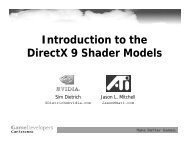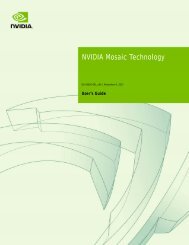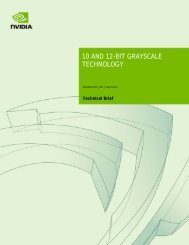GTC 2010 (Part 2) - Thrust By Example.pdf - Thrust - Google Code
GTC 2010 (Part 2) - Thrust By Example.pdf - Thrust - Google Code
GTC 2010 (Part 2) - Thrust By Example.pdf - Thrust - Google Code
Create successful ePaper yourself
Turn your PDF publications into a flip-book with our unique Google optimized e-Paper software.
<strong>Thrust</strong> by <strong>Example</strong><br />
Advanced Features and Techniques<br />
San Jose, California | Thursday, September 23, <strong>2010</strong> | Jared Hoberock (NVIDIA Research)
What is <strong>Thrust</strong>?<br />
#include <br />
#include <br />
#include <br />
int main(void)<br />
{<br />
// generate 16M random numbers on the host<br />
thrust::host_vector h_vec(1
Background<br />
• <strong>Thrust</strong> is a parallel implementation of the C++ STL<br />
— Containers and Algorithms<br />
— CUDA and OpenMP backends<br />
• This talk assumes basic C++ and <strong>Thrust</strong> familiarity<br />
— Templates<br />
— Iterators<br />
— Functors
Roadmap<br />
• CUDA Best Practices<br />
• How to Realize Best Practices with <strong>Thrust</strong><br />
• <strong>Example</strong>s<br />
• Extended example: 2D Bucket Sort<br />
• Performance Analysis
Best Practices<br />
• Fusion<br />
— Combine related operations together<br />
• Structure of Arrays<br />
— Ensure memory coalescing<br />
• Implicit Sequences<br />
— Eliminate memory accesses and storage
Fusion<br />
• Memory bandwidth is scarce<br />
• Many computations have low computational intensity<br />
• Keep intermediate results on chip
Fusion<br />
• Consider z = g(f(x))<br />
device_vector x(n); // input<br />
device_vector f_x(n); // temporary<br />
device_vector z(n); // result<br />
// compute f(x)<br />
transform(x.begin(), x.end(), f_x.begin(), f());<br />
// compute g(f(x))<br />
transform(f_x.begin(), f_x.end(), z.begin(), g());
Fusion<br />
• Consider z = g(f(x))<br />
device_vector x(n); // input<br />
device_vector f_x(n); // temporary<br />
device_vector z(n); // result<br />
// compute f(x)<br />
transform(x.begin(), x.end(), f_x.begin(), f());<br />
// compute g(f(x))<br />
transform(f_x.begin(), f_x.end(), z.begin(), g());<br />
Storage: 3 * n<br />
Bandwidth: 2 * n reads + 2 * n writes<br />
Temporaries: n
Fusion<br />
• A better way with transform_iterator<br />
device_vector x(n);<br />
device_vector z(n);<br />
// input<br />
// result<br />
// compute g(f(x))<br />
transform(make_transform_iterator(x.begin(), f()),<br />
make_transform_iterator(x.end(), f()),<br />
z.begin(),<br />
g());
Fusion<br />
• A better way with transform_iterator<br />
device_vector x(n);<br />
device_vector z(n);<br />
// input<br />
// result<br />
// compute g(f(x))<br />
transform(make_transform_iterator(x.begin(), f()),<br />
make_transform_iterator(x.end(), f()),<br />
z.begin(),<br />
g());<br />
Storage: 2 * n<br />
Bandwidth: n reads + n writes<br />
Temporaries: 0
<strong>Example</strong>: Slow Vector Norm<br />
// define transformation f(x) -> x^2<br />
struct square<br />
{<br />
__host__ __device__<br />
float operator()(float x)<br />
{<br />
return x * x;<br />
}<br />
};<br />
device_vector x_2(n); // temporary storage<br />
transform(x.begin(), x.end(), x_2.begin(), square());<br />
return sqrt(reduce(x_2.begin(), x_2.end()),<br />
0.0f,<br />
plus()));
<strong>Example</strong>: Fast Vector Norm<br />
// define transformation f(x) -> x^2<br />
struct square<br />
{<br />
__host__ __device__<br />
float operator()(float x)<br />
{<br />
return x * x;<br />
}<br />
};<br />
// fusion with transform_iterator<br />
return sqrt(reduce(make_transform_iterator(x.begin(), square()),<br />
make_transform_iterator(x.end(), square()),<br />
0.0f,<br />
plus()));
<strong>Example</strong>: Fast Vector Norm<br />
// define transformation f(x) -> x^2<br />
struct square<br />
{<br />
__host__ __device__<br />
float operator()(float x)<br />
{<br />
return x * x;<br />
}<br />
};<br />
// fusion with transform_reduce<br />
return sqrt(transform_reduce(x.begin(), x.end(),<br />
square()),<br />
0.0f,<br />
plus()));
<strong>Example</strong>: Fast Vector Norm<br />
// define transformation f(x) -> x^2<br />
struct square<br />
{<br />
__host__ __device__<br />
float operator()(float x)<br />
{<br />
return x * x;<br />
}<br />
};<br />
// fusion with transform_reduce<br />
return sqrt(transform_reduce(x.begin(), x.end(),<br />
square()),<br />
0.0f,<br />
plus()));<br />
Speedup: 7.0x (GTX 480)<br />
4.4x (GTX 280)
Structure of Arrays<br />
• Coalescing improves memory efficiency<br />
• Accesses to arrays of arbitrary structures won’t coalesce<br />
• Reordering into structure of arrays ensures coalescing<br />
struct float3<br />
{<br />
float x;<br />
float y;<br />
float z;<br />
};<br />
float3 *aos;<br />
...<br />
aos[i].x = 1.0f;<br />
struct float3_soa<br />
{<br />
float *x;<br />
float *y;<br />
float *z;<br />
};<br />
float3_soa soa;<br />
...<br />
soa.x[i] = 1.0f;
Structure of Arrays<br />
• Coalescing (Simple version)<br />
— Contiguous 4, 8, or 16 byte accesses are good<br />
data:<br />
int int int int int int int int<br />
threads:<br />
0 1 2 3 4 5 6 7
Structure of Arrays<br />
• Coalescing (Simple version)<br />
— Arrays of arbitrary data structures won’t necessarily coalesce<br />
— Large performance penalty on older hardware<br />
data:<br />
my_struct my_struct my_struct<br />
threads:<br />
0 1 2 3 4 5 6 7
Structure of Arrays<br />
• zip_iterator ―zips‖ up arrays into tuple on the fly<br />
— Performance benefit of coalescing<br />
— Conceptual goodness of structs<br />
int<br />
int<br />
int<br />
int<br />
int<br />
int<br />
tuple<br />
tuple<br />
tuple<br />
int<br />
int<br />
int
<strong>Example</strong>: Slow Vector Rotation<br />
struct rotate_float3<br />
{<br />
__host__ __device__<br />
float3 operator()(float3 v)<br />
{<br />
float x = v.x;<br />
float y = v.y;<br />
float z = v.z;<br />
float rx = 0.36f*x + 0.48f*y + -0.80f*z;<br />
float ry =-0.80f*x + 0.60f*y + 0.00f*z;<br />
float rz = 0.48f*x + 0.64f*y + 0.60f*z;<br />
}<br />
};<br />
return make_float3(rx, ry, rz);<br />
device_vector vec(n);<br />
transform(vec.begin(), vec.end(), vec.begin(), rotate_float3());
<strong>Example</strong>: Fast Vector Rotation<br />
struct rotate_tuple<br />
{<br />
__host__ __device__<br />
tuple operator()(tuple v)<br />
{<br />
float x = get(v);<br />
float y = get(v);<br />
float z = get(v);<br />
float rx = 0.36f*x + 0.48f*y + -0.80f*z;<br />
float ry =-0.80f*x + 0.60f*y + 0.00f*z;<br />
float rz = 0.48f*x + 0.64f*y + 0.60f*z;<br />
}<br />
};<br />
return make_tuple(rx, ry, rz);<br />
device_vector x(n), y(n), z(n);<br />
transform(make_zip_iterator(make_tuple(x.begin(), y.begin(), z.begin())),<br />
make_zip_iterator(make_tuple(x.end(), y.end(), z.end())),<br />
rotate_tuple());
<strong>Example</strong>: Fast Vector Rotation<br />
struct rotate_tuple<br />
{<br />
__host__ __device__<br />
tuple operator()(tuple v)<br />
{<br />
float x = get(v);<br />
float y = get(v);<br />
float z = get(v);<br />
float rx = 0.36f*x + 0.48f*y + -0.80f*z;<br />
float ry =-0.80f*x + 0.60f*y + 0.00f*z;<br />
float rz = 0.48f*x + 0.64f*y + 0.60f*z;<br />
}<br />
};<br />
return make_tuple(rx, ry, rz);<br />
device_vector x(n), y(n), z(n);<br />
transform(make_zip_iterator(make_tuple(x.begin(), y.begin(), z.begin())),<br />
make_zip_iterator(make_tuple(x.end(), y.end(), z.end())),<br />
rotate_tuple());<br />
Speedup: 1.3x (GTX 480)<br />
2.5x (GTX 280)
Implicit Sequences<br />
• Often we need ranges following a sequential pattern<br />
— Constant ranges<br />
• [1, 1, 1, 1, ...]<br />
— Incrementing ranges<br />
• [0, 1, 2, 3, ...]<br />
• Implicit ranges require no storage<br />
— constant_iterator<br />
— counting_iterator
<strong>Example</strong>: Slow Min Index<br />
// return the smaller of two tuples<br />
struct smaller_tuple<br />
{<br />
tuple operator()(tuple a, tuple b)<br />
{<br />
return min(a,b);<br />
}<br />
};<br />
device_vector indices(vec.size()); // allocate storage for explicit indices<br />
sequence(indices.begin(), indices.end()); // indices = [0, 1, 2, ...)<br />
tuple init(vec[0],0);<br />
tuple smallest;<br />
smallest = reduce(make_zip_iterator(make_tuple(vec.begin(), indices.begin())),<br />
make_zip_iterator(make_tuple(vec.end(), indices.end())),<br />
init,<br />
smaller_tuple());<br />
return get(smallest);
<strong>Example</strong>: Fast Min Index<br />
// return the smaller of two tuples<br />
struct smaller_tuple<br />
{<br />
tuple operator()(tuple a, tuple b)<br />
{<br />
return min(a,b);<br />
}<br />
};<br />
counting_iterator indices_begin(0); // create implicit range [0, 1, 2, ...)<br />
counting_iterator indices_end(vec.size());<br />
tuple init(vec[0],0);<br />
tuple smallest;<br />
smallest = reduce(make_zip_iterator(make_tuple(vec.begin(), indices_begin)),<br />
make_zip_iterator(make_tuple(vec.end(), indices_end)),<br />
init,<br />
smaller_tuple());<br />
return get(smallest);
<strong>Example</strong>: Fast Min Index<br />
// return the smaller of two tuples<br />
struct smaller_tuple<br />
{<br />
tuple operator()(tuple a, tuple b)<br />
{<br />
return min(a,b);<br />
}<br />
};<br />
counting_iterator indices_begin(0); // create implicit range [0, 1, 2, ...)<br />
counting_iterator indices_end(vec.size());<br />
tuple init(vec[0],0);<br />
tuple smallest;<br />
smallest = reduce(make_zip_iterator(make_tuple(vec.begin(), indices_begin)),<br />
make_zip_iterator(make_tuple(vec.end(), indices_end)),<br />
init,<br />
smaller_tuple());<br />
return get(smallest);<br />
Speedup: 2.7x (GTX 480)<br />
3.2x (GTX 280)
<strong>Example</strong>: Fast Min Index<br />
// min_element implements this operation directly<br />
return min_element(vec.begin(), vec.end()) – vec.begin();<br />
Speedup: 2.7x (GTX 480)<br />
3.2x (GTX 280)
Recap: Best Practices<br />
• Fusion<br />
— Eliminate superfluous memory traffic & storage<br />
— transform_iterator and transform_ algorithms<br />
• Structure of arrays<br />
— Ensures coalescing<br />
— zip_iterator<br />
• Implicit sequences<br />
— Avoid explicitly storing and accessing regular patterns<br />
— constant_iterator & counting_iterator
<strong>Example</strong>: 2D Bucket Sort<br />
Procedure:<br />
1. create random points<br />
2. compute bucket index for each point<br />
3. sort points by bucket index<br />
4. count size of each bucket<br />
6 7 8<br />
3 4 5<br />
0 1 2 3 4 5 6 7 8<br />
0 1 2
Implementation Choices<br />
Procedure:<br />
1. create random points<br />
2. compute bucket index for each point<br />
3. sort points by bucket index<br />
4. count size of each bucket<br />
6 7 8<br />
3 4 5<br />
0 1 2 3 4 5 6 7 8<br />
0 1 2
Implementation Choices<br />
• Where to generate random input?<br />
— Host versus device?<br />
• How to compute the size of each bucket<br />
— Binary search versus reduction?<br />
• Performance versus concision
Step 1: Create random points<br />
• On the host:<br />
// return a random float2 in [0,1)^2<br />
float2 make_random_float2(void)<br />
{<br />
return make_float2( rand() / (RAND_MAX + 1.0f),<br />
rand() / (RAND_MAX + 1.0f) );<br />
}<br />
// allocate some random points in the unit square on the host<br />
host_vector h_points(N);<br />
generate(h_points.begin(), h_points.end(), make_random_float2);<br />
// transfer to device<br />
device_vector points = h_points;
Step 1: Create random points<br />
• On the device with an RNG:<br />
struct make_random_float2<br />
{<br />
__host__ __device__<br />
float2 operator()(int index)<br />
{<br />
default_random_engine rng;<br />
}<br />
};<br />
// skip past numbers used in previous threads<br />
rng.discard(2*index);<br />
return make_float2( (float)rng() / default_random_engine::max,<br />
(float)rng() / default_random_engine::max);<br />
// generate random input directly on the device<br />
device_vector points(N);<br />
transform(make_counting_iterator(0),<br />
make_counting_iterator(N),<br />
points.begin(), make_random_float2());
Step 1: Create random points<br />
• On the device with an integer hash:<br />
struct make_random_float2<br />
{<br />
__host__ __device__<br />
float2 operator()(int index)<br />
{<br />
return make_float2( (float)hash(2*index + 0) / UINT_MAX,<br />
(float)hash(2*index + 1) / UINT_MAX);<br />
}<br />
};<br />
// generate random input directly on the device<br />
device_vector points(N);<br />
transform(make_counting_iterator(0),<br />
make_counting_iterator(N),<br />
points.begin(), make_random_float2());
Step 1: Create random points<br />
• Host implementation causes unnecessary serialization and<br />
copy<br />
• Device implementation performed in situ but has different<br />
tradeoffs<br />
— rng.discard(n) is lg(n)<br />
— Integer hash is fast but low quality
Step 2: Compute bucket index for each<br />
point<br />
// a functor hashing points to indices<br />
struct point_to_bucket_index<br />
{<br />
unsigned int w, h;<br />
__host__ __device__<br />
point_to_bucket_index(unsigned int width, unsigned int height)<br />
:w(width), h(height){}<br />
__host__ __device__<br />
unsigned int operator()(float2 p)<br />
{<br />
// coordinates of the grid cell containing point p<br />
unsigned int x = p.x * w;<br />
unsigned int y = p.y * h;<br />
}<br />
};<br />
// return the bucket's linear index<br />
return y * w + x;
Step 2: Classify each point<br />
// resolution of the 2D grid<br />
unsigned int w = 200;<br />
unsigned int h = 100;<br />
// allocate storage for each point's bucket index<br />
device_vector bucket_indices(N);<br />
// transform the points to their bucket indices<br />
transform(points.begin(),<br />
points.end(),<br />
bucket_indices.begin(),<br />
point_to_bucket_index(w,h));<br />
6 7 8<br />
3 4 5<br />
0 1 2
Step 3: Sort points by bucket index<br />
sort_by_key(bucket_indices.begin(), bucket_indices.end(), points.begin());<br />
0 1 2 3 4 5 6 7 8
Step 4: Compute the size of each bucket<br />
• Using reduction:<br />
// allocate space to hold per-bucket sizes<br />
device_vector bucket_sizes(width * height);<br />
// allocate some random points in the unit square on the host<br />
reduce_by_key(bucket_indices.begin(), bucket_indices.end(),<br />
make_constant_iterator(1),<br />
bucket_indices.begin(),<br />
bucket_sizes.begin());<br />
// keys = {0, 0, 2, 3, 3, 3, 4, 6, 7, ... } // bucket_indices<br />
// values = {1, 1, 1, 1, 1, 1, 1, 1, 1, ... } // constant_iterator<br />
// ==><br />
// output_keys = {0, 2, 3, 4, 6, 7, ... } // bucket_indices<br />
// output_values = {2, 1, 3, 1, 1, 1, ... } // bucket_sizes<br />
// note empty buckets do not appear in the output
Step 4: Compute the size of each bucket<br />
• Using binary search:<br />
// bucket_begin[i] indexes the first element of bucket i<br />
// bucket_end[i] indexes one past the last element of bucket i<br />
device_vector bucket_begin(w*h);<br />
device_vector bucket_end(w*h);<br />
// used to produce integers in the range [0, w*h)<br />
counting_iterator search_begin(0);<br />
// find the beginning of each bucket's list of points<br />
lower_bound(bucket_indices.begin(), bucket_indices.end(),<br />
search_begin, search_begin + w*h, bucket_begin.begin());<br />
// find the end of each bucket's list of points<br />
upper_bound(bucket_indices.begin(), bucket_indices.end(),<br />
search_begin, search_begin + w*h, bucket_end.begin());
Step 4: Compute the size of each bucket<br />
• Using binary search:<br />
// allocate space to hold per-bucket sizes<br />
device_vector bucket_sizes(w*h);<br />
// take the difference between bounds to find each bucket’s size<br />
transform(bucket_end.begin(), bucket_end.end(),<br />
bucket_begin.begin(),<br />
bucket_sizes.begin(),<br />
minus());<br />
// bucket_size[i] = bucket_end[i] – bucket_begin[i]<br />
// note each bucket’s size appears in the output even if it is empty
Performance Methodology<br />
• 10M Points<br />
• Software: <strong>Thrust</strong> 1.3 + nvcc 3.2<br />
• Hardware: GeForce 480 GTX + Intel i7<br />
• Memory allocation and copying is included in timings
Milliseconds<br />
Performance Profile (Lower is Better)<br />
60<br />
50<br />
RNG<br />
40<br />
30<br />
Host<br />
20<br />
10<br />
0<br />
Reduction<br />
Hash<br />
Search<br />
Initialization Classification Sort Count Count
G points/sec<br />
Billions<br />
Throughput (Higher is Better)<br />
20<br />
18<br />
16<br />
14<br />
12<br />
10<br />
8<br />
6<br />
4<br />
2<br />
0<br />
Search<br />
Hash<br />
Host RNG<br />
Reduction<br />
Initialization Classification Sort Count
Analysis<br />
• Point generation<br />
— Host initialization is simple, but wastes memory and host->device<br />
bandwidth<br />
— Device initialization with RNG adds modest complexity but<br />
correctly avoiding correlation is expensive<br />
— Device initialization with hash is simple and fast but low quality<br />
— Generate input in situ when possible<br />
— Use a domain specific vendor RNG library if you need fast + high<br />
quality numbers
Analysis<br />
• Sort<br />
— Dominates performance of the optimized implementation<br />
— Very fast when keys are primitives (char, int, float, etc.)<br />
— When in doubt, ask ―Can thrust::sort solve this problem?‖
Analysis<br />
• Count<br />
— reduce_by_key is general & simple – use for prototyping<br />
— transform + sort_by_key + reduce_by_key = MapReduce<br />
— Common pattern: bring like items together and reduce<br />
— <strong>Example</strong>s: word count, histogram, rendering, run length encoding,<br />
etc.
Analysis<br />
• Count<br />
— Binary search yielded a massive advantage over reduce_by_key<br />
given a little extra effort for this problem<br />
— Applicable to this case because keys happened to be sorted<br />
— Requires extra storage for interval bounds<br />
— reduce_by_key likely to get faster in the future
More <strong>Example</strong>s on <strong>Google</strong> <strong>Code</strong> Site<br />
• Monte Carlo Integration<br />
• Run-Length Encoding<br />
• Summed Area Table<br />
• Moving Average<br />
• Word Count<br />
• Voronoi Diagram<br />
• Graphics Interop<br />
• Mode<br />
• Stream Compaction<br />
• Lexicographical Sort<br />
• Summary Statistics<br />
• Histogram<br />
And many more!
Summary<br />
• CUDA best practices are easy with <strong>Thrust</strong><br />
— Fusion: transform_iterator<br />
— SoA: zip_iterator<br />
— Sequences: counting_iterator<br />
• Efficient use of memory<br />
— Maximize bandwidth<br />
— Eliminate redundancies<br />
— Perform operations in situ
Summary<br />
• <strong>Thrust</strong> enables interesting CUDA applications with minimal<br />
effort<br />
• thrust::sort everything<br />
— 805M keys/sec on GTX 480<br />
— Bring like items together, reduce<br />
— MapReduce
<strong>Thrust</strong> on <strong>Google</strong> <strong>Code</strong>
Resources<br />
• Quick Start Guide<br />
• API Documentation<br />
• Source <strong>Code</strong><br />
• Mailing List: thrust-users on <strong>Google</strong> Groups
Questions?<br />
jhoberock@nvidia.com<br />
http://thrust.googlecode.com















